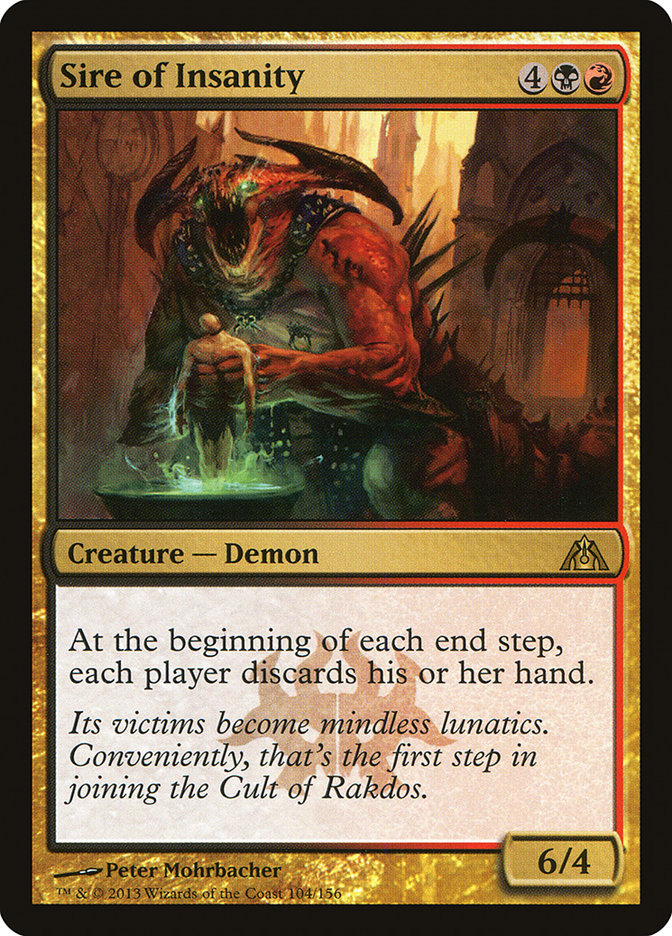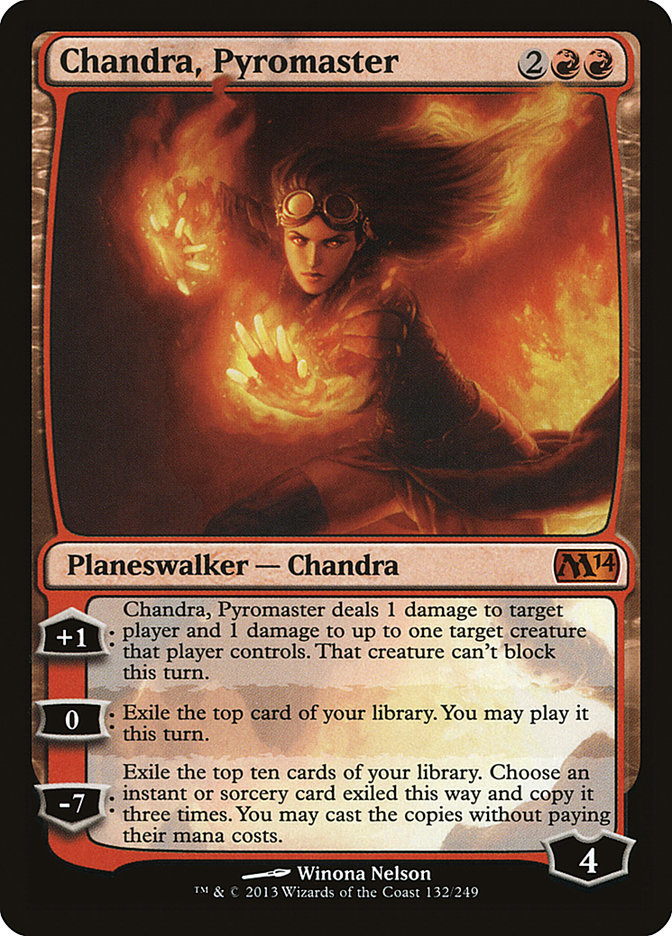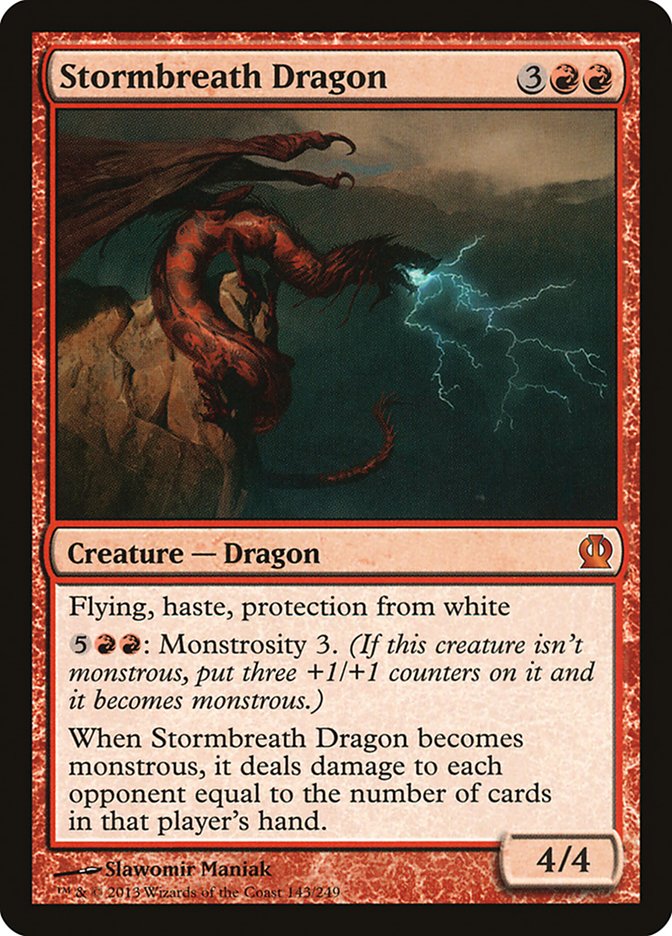Flexibility & Jund
I made a trip down to South Florida to play in a win a case of Theros Standard tournament. It was round 2, and I was playing against the only deck and player in the room I was scared of. Not because he’s better or smarter than me. No, not at all. The player was John Dean of Mark Nestico article fame. It was because he was piloting the U/W Tapout deck and it was one of the few decks I had no experience playing against with the deck I was running. The one I left you with in my last article: Jund Midrange. All I knew for sure was he would tap out to play planeswalkers, Supreme Verdict, and Master of Waves.
Game 1 he easily crushed me as he dropped down planeswalkers and swept the board of my creatures. Eventually he refueled with a Sphinx’s Revelation, and there wasn’t much I could do. Game 2 was a much different game; I resolved an early Chandra, Pyromaster, while he failed to do a whole lot of anything. It probably didn’t help that he mulliganed down to four cards.
The most interesting game was definitely the deciding one. I pressured him early with a Polukranos, World Eater. That forced him to Supreme Verdict it away. With him tapped out I dropped down a Chandra, Pyromaster. In a desperate act to find lands, he had to Sphinx’s Revelation for two during his main phase. He hit his land and passed the turn.
Then it happened. The reason why I’m not playing Rakdos’s Return.
I untapped, casually dropped down my sixth land, and played Sire of Insanity. His eyes grew as big as the moon as it dawned on him that he was losing his full hand of spells. With Chandra fueling the board and Sire of Insanity pressuring his life total, it didn’t take long to secure the win.
The rest of the tournament didn’t quite go as I had planned. I did make it to the Top 8, knocking out my girlfriend in the process who finished in ninth place. Then in the quarterfinals I played against Esper Control, which is a deck I’m normally quite excited to see. Game 1 he won the roll and began with a turn 3 Ashiok, Nightmare Weaver. He milled three spells and passed the turn as I end-of-turn Magma Jetted to try to find action. Putting two lands on the bottom, I drew a land for my turn. Again I passed the turn. He milled three more spells with Ashiok and passed back to me, where I once again end of turn Magma Jetted two lands to the bottom and drew a land.
Are you beginning to see a pattern here?
Game 2 he failed to draw a planeswalker, while I draw every Dreadbore and Abrupt Decay in my deck. I managed to get him to one life, and a topdecked Supreme Verdict later I drew lands the rest of the game and lost.
But I’m not even mad.
The deck performed well given the amount of times I drew an unreasonable amount of lands or types of spells like all removal or no removal. With the Pro Tour all wrapped up, Devotion decks are the new hip thing. This bodes particularly well for us since we kill all the things. Here’s where I am with the deck today and where I see the format shifting from here:
Creatures (18)
- 3 Scavenging Ooze
- 2 Sire of Insanity
- 3 Polukranos, World Eater
- 4 Sylvan Caryatid
- 4 Stormbreath Dragon
- 2 Reaper of the Wilds
Planeswalkers (3)
Lands (25)
Spells (14)

It’s bold to play three colors without having perfect mana fixing. This is why we have to compromise on some of our spells. In a perfect world I’d be playing cards like Desecration Demon and Hero’s Downfall over cards like Reaper of the Wilds and Dreadbore, but the mana just isn’t there to support the double-green spells, double-red spells, and double-black spells. I opted to compromise black as more of a splash than a main color since green provides the fixing with Sylvan Caryatid and red gives us Chandra, Pyromaster and Stormbreath Dragon.
We have a good spread of removal mainly so we don’t have a bunch of dead draws against certain decks. For example, if we played four Putrefys, it would be fairly miserable to draw them against a deck like Esper control where there is at most one target in the entire deck. We spread the removal out with two Abrupt Decays and two Dreadbores; these are great catchalls that work against both aggressive and control strategies. Even the Abrupt Decays aren’t dead since control decks play cards like Detention Sphere; Ashiok, Nightmare Weaver; and Chained to the Rocks. The goal here is to minimize dead draws but maximize the flexibility of our removal.
Since Devotion decks are the new thing on the block, a lot of people will be playing them. With that logic it’s reasonable to assume the next step to stay ahead of the metagame is to find a deck that beats them. It seems like Esper Control deck has a really easy matchup against devotion-based decks. Going one step deeper is to play a deck that focuses on beating both Esper and Devotion.
Inception!
That’s why I love Jund Midrange right now. We combat Esper Control with the hand disruption, planeswalkers, and large creature threats. The amount of removal we’re packing helps us fight the Devotion decks. The flexibility of Jund lets us adapt to whatever the format is throwing at us. As long as we stay ahead of the metagame, we’ll be happy to play this deck.
PTQ Prep
There’s a Sealed Theros PTQ this weekend I plan on attending in Orlando, Florida. My track record for Limited PTQs is off the charts. Historically I haven’t been blessed by the card pool gods, and while it’s certainly nice to be handed a near-perfect pool, I’m not going to count on that. If you want to win a PTQ, I’m going to let you in on a little secret to my success.
Play a lot of Sealed and do even more drafts.
That’s it.
It’s not very complicated. Play a lot and success will follow. By playing a lot of the format, you will become more aware of all the little tricks your opponent can have and what to play around. Sure, sometimes your opponent will just have a card pool that is nearly unbeatable. You can’t really prepare for that and just have to take your beats when they come. Most times though you’ll be playing against someone who has a very similar pool to yourself playability-wise. Just being aware of what they can have and knowing when to represent something you might not have can go a long way in making it to the Top 8 draft. It doesn’t matter how good you are unless you can close it out in the Draft portion.
I’ve been preparing a lot recently for the PTQ this weekend. Every night for the last week and a half, I’ve done at least one draft but more on the border of three or four.
But John, how on Earth do you have the time for that many?
The answer is Magic Online. Magic Online is pivotal in improving your gameplay and decision-making within the game. If you don’t believe me, ask Reid Duke or Brad Nelson. They’ll tell you how important it was to get them to where they are today. The flexibility of Magic Online allows you to draft on your schedule, not the schedule of your local playgroup or shop. If you haven’t already, I beg you to give it a shot. If you have tried it, then please continue playing it. The shuffler is not out to get you. I promise!
Wish me luck as I attempt to take down another Limited PTQ and get myself back on the Pro Tour. If you’re playing in the SCG Open Series in Seattle this weekend or the Grand Prix in Louisville, give Jund Midrange a try. It’s been a true gem for me and will be for you too.
Gosu. on Magic Online
@JCuvelier on Twitter



